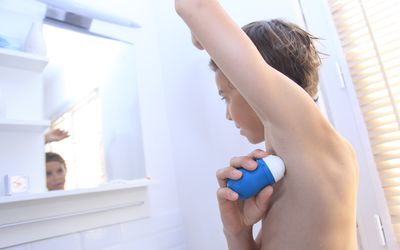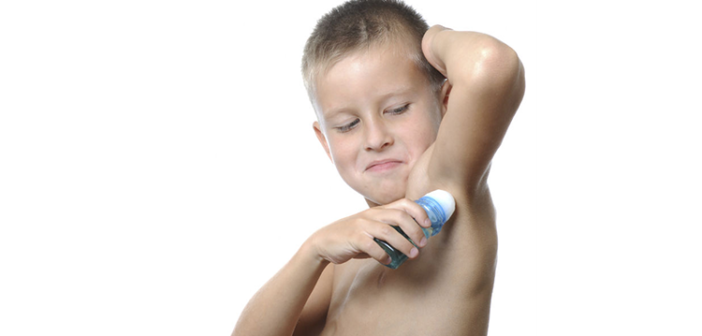The topic of body odour is a sensitive one at the best of times but when your child starts to get a bit whiffy, it can be hard to know how to approach things. They might be embarrassed or could even be oblivious. Either way, having obvious body odour can open your child to teasing from peers.
Understanding body odour and why it happens will help you have an open conversation about it with your child so you can manage the issue together.
More Than One Type Of Sweat
Most body odour originates from sweat. Interestingly, there are two types of sweat glands.
In the dermis of the skin, all over the body, are eccrine glands. These glands excrete salty water from the skin’s pores. There are high concentrations of them in your palms, armpits and soles of your feet. These act as evaporative cooling for your body, helping to reduce body temperature in hot weather, during exercise or even when we have a fever.
Apocrine glands are found only in the armpits and perianal regions of the body. The sweat from these glands is excreted through hair follicles and is an oily substance. The apocrine glands, linked to adrenaline release, produce sweat during physical activity, fear, stress or anxiety.

The apocrine glands are activated with the onset of puberty which is why you might start to notice body odour (BO) on your child around the same time as other puberty signs such as increased body hair. This can occur as early as 7 years old in girls and 9 years old in boys.
Why Sweat Smells
Eccrine sweat (salty sweat) has no natural smell, while apocrine sweat has a slight odour. However, what makes sweat smell is when the bacteria on our skin and clothes interacts with it.
A lot of body odour comes from bacteria feeding on the oily apocrine sweat in armpits and the groin region. Feet can also produce bad smells as sweat and bacteria are trapped inside shoes and socks.
Obviously, poor hygiene can make smells worse, as can certain foods such as garlic.
Addressing Body Odour
The best way to deal with body odour is to talk openly with your child. Here are some useful tips to share with them:
- Practice good hygiene, including daily bathing with special care taken to clean armpits, feet and genitals.
- Wearing clean clothes every day.
- Avoid wearing wet shoes.
- Stay hydrated.
- Use an antiperspirant or deodorant. Natural deodorants are a good choice for young, sensitive skin. Here is a great review of 10 of the best natural deodorants available in Australia.
It is important to know that a distinct body odour can also be a sign of an underlying medical condition. If your child’s body odour isn’t addressed by the suggestions above, it is wise to seek medical advice.


1 Comment
Pingback: Should You Shower Every Day? - School Mum